
- October 2012
- Volume 3
- Issue 5
Providing the Total Package
To provide complete services to the specialty patient in the home care setting, specialty pharmacies and specialty nurses need to clearly define their individual responsibilities.
To provide complete services to the specialty patient in the home care setting, specialty pharmacies and specialty nurses need to clearly define their individual responsibilities.
Community-based retail pharmacies were actually the first to provide specialty therapies to patients in their community. Typically, these pharmacies focused on obtaining and delivering the specialty drugs, which took the pressure off patients, saved them money, and even improved outcomes. Today, due to the complex nature, high cost, and competitive business of specialty therapies, expectations have grown beyond the service of just providing the medications to patients.
Expectations now include services that provide prior authorization assistance, supplies, durable medical equipment (DME), lab draws, patient education, and drug administration. These expectations are not inexpensive and come at an additional cost to the specialty pharmacy (SP). The community-based pharmacies that venture into the specialty therapy drug space need to consider these questions: 1) How they will provide these additional services? 2) What additional personnel will they need to provide the services? and 3) Who will pay for these services?
The term “delegation of responsibilities” defines who provides what services between pharmacy and nursing in the home care setting. Often, the community-based SPs assume that nursing provides the infusion supplies and DME, when in reality they do not. In general, the SP is responsible for the drugs, supplies, DME, and lab supplies. Nursing is responsible for teaching, administering, and providing documentation of the therapy given. This creates additional costs of services to the SP.
Physicians evaluate what services the community-based SP will provide in order to meet the needs of its patients. They welcome any assistance the SP can offer them with prior authorization. Obtaining prior authorization can take months. It requires working one-on-one with the physician’s office to obtain all medical information required for the approval. Many times, especially with new therapies, it is initially denied and must go into appeals.
This involves both the SP and the physician. The physician relies on the SP to assist them through this process and to write the script for the drug. It is very time-consuming for both parties and will require additional resources from the SP. The more the SP assists, the more likely the physician will write the script to that SP. Many times, the SP will need to provide a reimbursement expert to assist with this service, again creating additional costs to the SP for services.
Coverage of supplies and DME may involve reviewing and updating the community-based SP payer contracts to include a per diem rate to cover supplies and a DME addendum. The community-based SP may need to enter into an agreement with a medical supply vendor to provide infusion supplies and the DME not normally required with oral or injectable medications. The community-based SP also will need to evaluate if they will buy, lease, or rent equipment for infusions that require pumps or special monitoring devices. This equipment requires special care and maintenance. Renting is usually the preferred method, and the communitybased SP can pass through the cost to the payer if they have the DME as part of their contract.
Labs are also a requirement of many of the therapies. The community-based SP is responsible for providing these supplies at the home for the nurse, and they will need to enter into a contract with a vendor that provides blood-drawing equipment. These “lab in a box” kits, usually sent out by the SP with the drug and supplies, are an additional cost to the SP. This includes not only the cost of the kit, but the shipping of the labs from the patient home to the lab.
Nursing is one of the most costly and time-consuming services for the community-based SP. It is not uncommon for the nursing services to be covered by the SP. Pharmacies spend numerous hours searching for a home care agency to service their patients and bill the payer. The patient’s benefits do not always cover nursing. Often the SP needs to contract directly with infusion nurses or agencies that provide infusion nurses. The nursing services are usually covered out of the margins of the drug.
Community-based pharmacies engaging in SP therapies need to take into account the expectation of services and the delegation of responsibilities in today’s marketplace. If they can prepare for these additional costs of services while meeting the needs of their community, it will give them an edge in the referral process from a local community perspective.
About the Author
Cherylann Gregory, RN, BSN, is founder and president of the Specialty Pharmacy Nursing Network (SPNN) and has more than 30 years of experience as an oncology/ infusion nurse. SPNN provides a nationwide network of 500 qualified nurses for specialty pharmacies and biotech manufacturers. Services include coordination of care, drug administration, first dosing, education, clinical outcome data collection and reporting, and on-call coverage for specialty therapies. Visit www.spnninc.com.
Articles in this issue
over 13 years ago
Investing in Technologyover 13 years ago
The ESI-Medco Merger: Don't Overlook the Independent Pharmacistover 13 years ago
Near-Term Specialty Pipeline Highlightsover 13 years ago
Genetech's Erivedgeover 13 years ago
Technology Is Driving the Busover 13 years ago
Data Aggregation: A Key Component to Successover 13 years ago
The Value of Data in Specialty Pharmacyover 13 years ago
The Role of Specialty Pharmacies in Accountable Care OrganizationsNewsletter
Stay informed on drug updates, treatment guidelines, and pharmacy practice trends—subscribe to Pharmacy Times for weekly clinical insights.


























